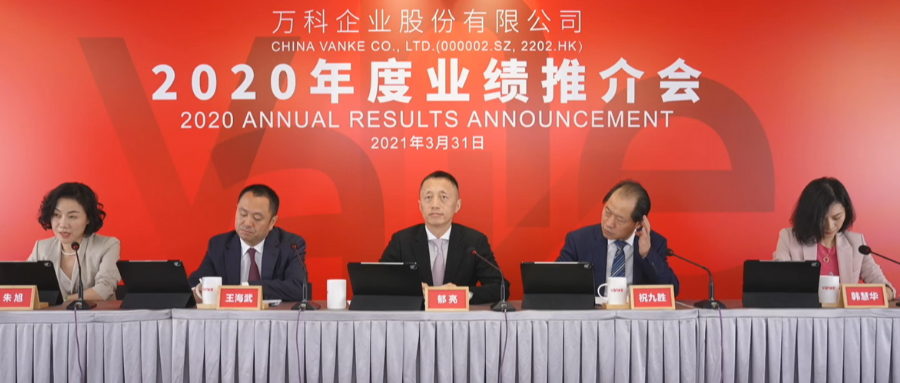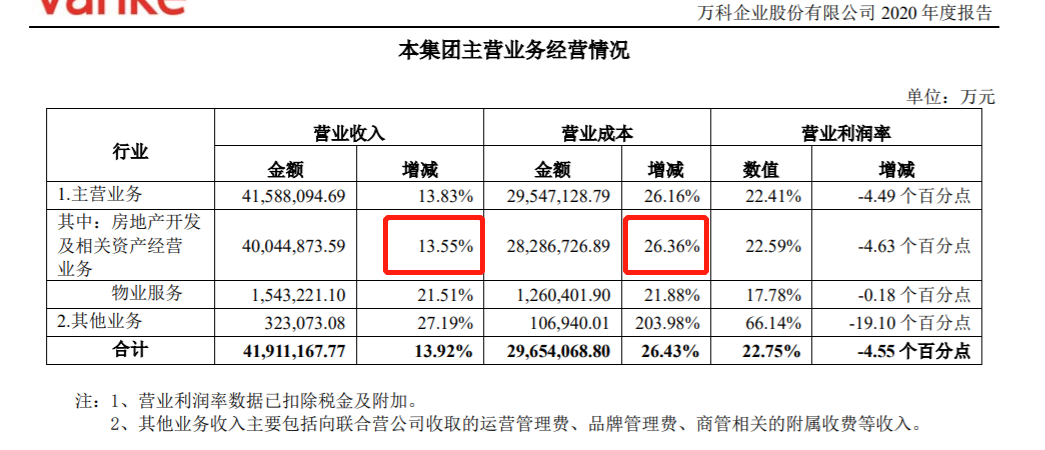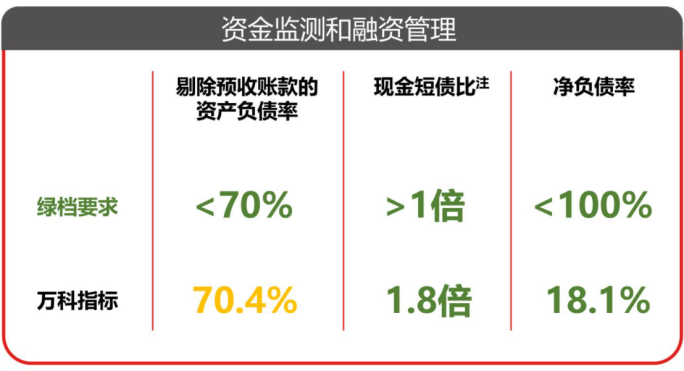Gross margin declined, talent challenges encountered
Editor’s note: This article is from the micro-channel public number “next available habitat” (ID: hifuturecity), Author: Zhao Xiaoli.
At the Vanke performance meeting, Zhu Jiusheng said frankly that it is more difficult to make money now than in the past.
On the evening of March 30, Vanke (000002.SH) released the 2020 performance report:
The sales area is 46.675 million square meters, a year-on-year increase of 11.6%;
Operating income was 419.11 billion yuan, a year-on-year increase of 13.9%;
Net profit attributable to shareholders of listed companies is 41.52 billion yuan, a year-on-year increase of 6.8%;
Judging from the data in this financial report, Vanke’s sales performance is growing, and shareholders’ net profit is also good, but it does not mean that this is a perfect score. In 2020, the gross profit margin of Vanke’s real estate and related businesses dropped by 4.6 percentage points year-on-year.
While sales performance hit a new high, Vanke in 2020 is not as profitable as expected.
01
Gross profit margin is record low
According to the financial report, Vanke’s real estate business achieved sales of 704.15 billion yuan, an increase of 11.6% year-on-year. The gross profit margin of the group’s real estate and related businesses was 22.6%, a year-on-year decrease of 4.6 percentage points. The Group’s fully diluted return on equity was 18.5%, a year-on-year decrease of 2.2 percentage points.
However, when a securities analyst asked the reason for its decline, Vanke President Zhu Jiusheng only explained the industry phenomenon, but did not give a positive answer. In addition, Zhu Jiusheng said that, affected by the gross profit margin of the real estate industry, it is more difficult to create value for shareholders, and it is necessary to work harder than before.
Behind the gross profit margin is the subtle relationship between cost and profit. But it is clear that the increase in operating costs of Vanke’s main business and other businesses is greater than the increase in operating income. Taking out the data of Vanke’s real estate development and related asset management business separately, the profit in 2020 has increased by 47.7 billion, but the cost has also increased by 59 billion, and the two offsets have reduced the profit by more than 10 billion.
At the same time, Vanke is still a yellow-file company under the new “three red lines” financing regulations.
As of the end of 2020, Vanke’s net debt ratio was 18.1% (up to the standard), and the short-term cash debt ratio was 2.35 (up to the standard). After excluding advance receipts, the debt-to-asset ratio rose to 81.3% (not up to the standard, the standard line was 70%) ). In response to this, Han Huihua, head of Vanke’s finance, said, “I am confident of returning to the “green file” in the first quarter.
But it is undeniable that the past 2020 has been a very difficult year for the real estate industry and many other industries. It is not easy for real estate companies to maintain stable growth.
The debt ratio is highly correlated with land acquisition. The net debt ratio of 18.1% is already at a low level in the industry, but Yu Liang, chairman of Vanke’s board of directors, said, “Vanke will not pursue a low net debt ratio and will maintain a reasonable net debt ratio. Rate. Vanke is waiting for opportunities. For example, land supply issues require great flexibility in funding and waiting for opportunities for market changes.”
02
The future acquisition of land will not chase higher
From the aspect of land acquisition, in 2020, Vanke will add 168 new projects, with a total planned construction area of 33.665 million square meters, an equity planning construction area of 20.588 million square meters, a total equity land value of 138.15 billion yuan, and an average land price of 6710. Yuan/square meter.
As of the end of 2020, the total construction area of Vanke’s projects under construction is about 107.876 million square meters, and the equity construction area is about 63.808 million square meters; the total construction area of the projects under planning is about 50.508 million square meters.
There are also many doubts from the outside world about Vanke’s “conservative” status in the land market. Yu Liang said at the performance meeting that Vanke had put forward the strategy of “no land hoarding, no holding of land, no land king” in 2007, and never pursued excessive land reserves.
The Shell Research Institute believes that in 2021, the land “two-concentration” policy and the requirements for capital flexibility are in line with Vanke’s long-term adherence to the financial characteristics of low debt and high liquidity.
“Enterprises can no longer rely on hoarding raw materials and earning money from land appreciation, nor can they rely on increasing leverage to earn money from financial leverage.”04
Vanke has encountered a talent challenge
“Although you can’t make big and fast money in the future, you can make slow, long, and honest money.” In Yu Liang’s view, “big money” and “quick money” are the golden real estate stages of the past.
Zhang Ruimin said that there are no successful companies, only the companies of the times. Because the so-called successful enterprise is just because it has stepped into the beat of the times.
In the past ten years, Vanke has been the benchmark of the industry. Looking at Vanke, you know how much imagination and space the real estate industry has. But now whether it is the main business, digitalization, long-term rental apartment, logistics, commerce, etc., although Vanke has done a certain scale, it is no longer a learning benchmark.
The current Vanke has instead become a risk observation indicator for the real estate industry. If Vanke has no problems, the real estate industry will not have major problems.
For the development of the industry, Yu Liang believes that the return of real estate to industrial attributes has become a clear and clear trend, which means that the industry’s return level will gradually move closer to the social average level, which means that real estate should shift from development-oriented to development and operation At the same time, housing will become more and more like durable consumer goods, development business will become more and more like manufacturing, and business operations are essentially content operations and will become more and more like service industries.
Yu Liang also mentioned the “management bonus era”, including changes in customer needs and urban development. Along the two main lines of customer demand and urban development, the industry still has plenty of opportunities.
Compared with the scale and profit that the outside world is concerned about, in Yu Liang’s view, the challenge that Vanke has encountered is actually a “talent challenge.” Vanke needs talents with 10 points, outstanding in society, and talents are a problem that Vanke needs to solve in the era of management dividends.
In the future, what we are more looking forward to is whether Vanke can contribute to the service? Can organizational changes break the barriers between businesses? What is the market value and space of Vanke Property?


